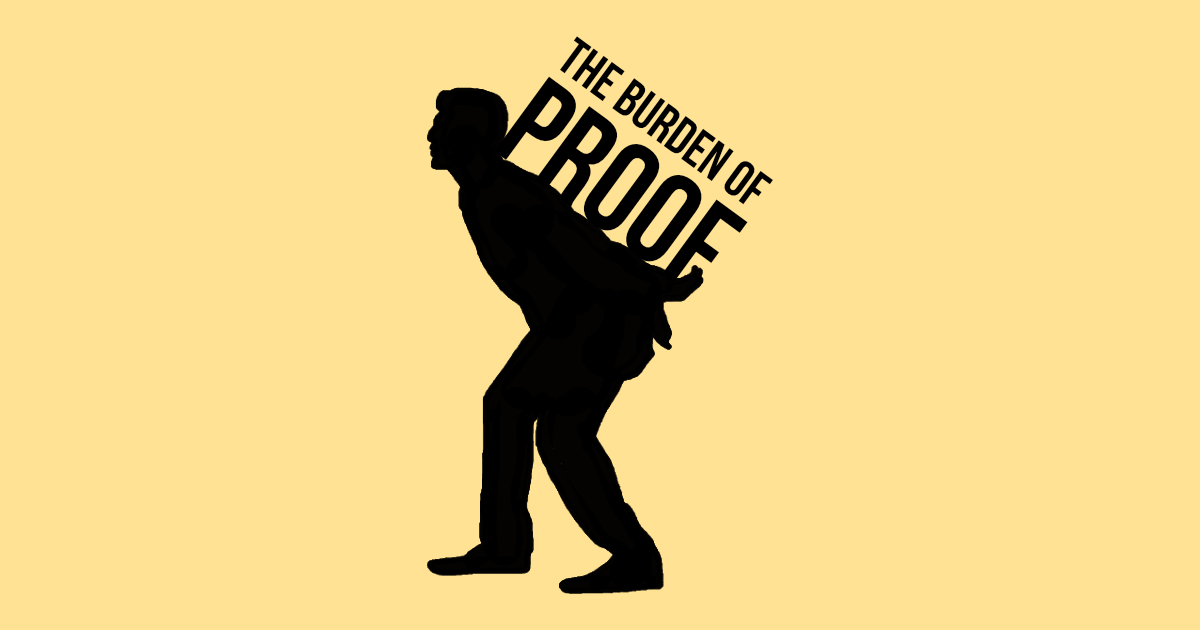Burden of Proof
 I want to talk for a little bit about the dumbest part of the conversation around Faith and Reason. The “Burden of Proof”. That’s the question, of who it is, in a given debate or conversation, that is required to support their ideas with evidence, and who holds the “default” position. It comes up in every single dang conversation about the Existence of God between theists and atheists, with both sides insisting that they don’t ever have the burden of proof by virtue of who they are.
I want to talk for a little bit about the dumbest part of the conversation around Faith and Reason. The “Burden of Proof”. That’s the question, of who it is, in a given debate or conversation, that is required to support their ideas with evidence, and who holds the “default” position. It comes up in every single dang conversation about the Existence of God between theists and atheists, with both sides insisting that they don’t ever have the burden of proof by virtue of who they are.
This is of course, not the case, but even if it were it would be dumb.
Whoever makes the claim has the burden of proof. So if an atheist walks up to a Christian and says “There is no God” then the atheist would have to prove that claim they made. Meanwhile if a Christian walks up to an atheist and says “There is a god” it would be on them to support that claim.
The sorts of atheists who like to get in arguments on the internet and elsewhere try to avoid this obvious reality by claiming that atheism is not a position at all. They will tell you that atheists do not believe that there is no god, (which would be a statement that could be defended or not) but merely that they “lack belief in a god” which is like, just, whatever bro.
Regardless though, whether or not it is part and parcel of the belief system called “atheism” if a person of any persuasion makes a claim on any sort, “You’re wrong” or “That’s dumb” or “there is no god” then all their posturing about the precise definition of atheist becomes irrelevant. “Okay, so you are an atheist that also believes my Christianity is incorrect. Go ahead and tell me why”
Would-be defenders of Christianity tend to posture in a way that is more complicated, but no less irrelevant. Every society believes in some kind of God as it develops, it is only after quite a bit of time they think of atheist. Perhaps it is a “properly basic belief” a la Immanuel Kant. Perhaps there is an evolutionary argument for it, or against naturalism. Perhaps Calvinism is true and affirmative belief can only come from the Holy Spirit through the Word of God. Whatever! It’s irrelevant! Because no matter how much advanced philosophy and theology you utilize, if you bring up the conversation it’s on you to support it.
But all of that doesn’t even begin to touch on the real idiocy of this metadebate. And that’s what this is, it’s a metadebate. It’s a debate about debate. In every debate there are two sides, there is a PRO and a CON, or an AFF and a NEG. One side talks first, makes a claim, starts a discussion, the other side is defending. The PRO has the burden of proof, the other side has what is called “presumption” meaning that if there were ever a tie, should the other side fail to furnish any argument at all for their perspective, or any evidence, or should both sides manage to thoroughly shoot down the others in exactly equal proportion. The CON would win the debate.
And that’s all you get. You win ties. You do not get to sit back and do nothing. You do not get to be the judge of whether or not the PRO/AFF side has demonstrated their point with absolute certainty or to your personal satisfaction. All you get, by not having the so dutifully avoided “burden of proof” is the presumption in case the other side says absolutely nothing.
That word “proof” throws people off. It doesn’t mean a smoking gun. Circumstantial evidence is enough to overcome presumption in virtually any debate context.
So suppose a Christian makes the claim, takes upon herself the burden of proof. She says “Jesus is LORD”, at which point an atheist, choosing to debate her, can either say “There is no such thing as the Lord” or they can be more careful and say something like “Independent of whatever I believe or don’t believe, I think you are wrong about that” either way, the Christian has the burden of proof.
Then suppose that the atheist does nothing, confident they do not have the burden of proof.
Well then they lose the debate, obviously. As long as the Christian says anything at all, even terrible evidence will win against nothing. “My grandma told me so and she’s real nice” is better than nothing. The only way the say-nothing atheist would win is if the Christian also said nothing. Then the atheist would win on presumption.
Do you see how completely, totally pointless this whole argument is?